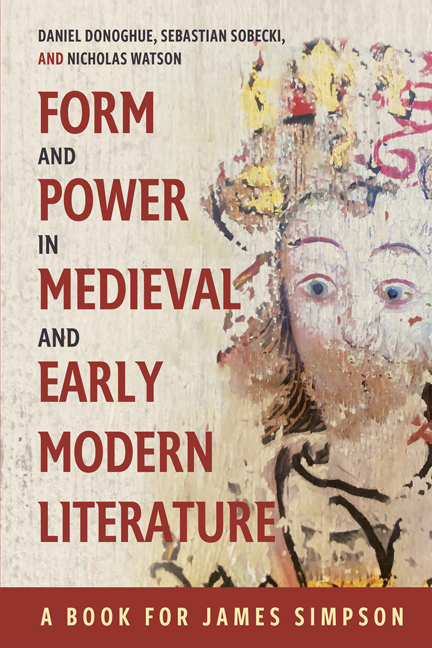Book contents
- Frontmatter
- Contents
- List of Illustrations
- Contributors and Editors
- Acknowledgments
- List of Abbreviations
- Simpson: An Interim Report
- PART I THE HERMENEUTICS OF RECOGNITION
- PART II GENRE AND FIGURE
- PART III CULTURE AND INSTITUTIONS
- PART IV REFORMATIONS
- James Simpson’s Publications from 1984 to 2024
- Bibliography
- A Note on the Bloomfield Conferences
- General Index
- Tabula Gratulatoria
6 - “Thynke nat the contrary”: Field Notes in the Ecology of Medieval Romance
Published online by Cambridge University Press: 17 May 2024
- Frontmatter
- Contents
- List of Illustrations
- Contributors and Editors
- Acknowledgments
- List of Abbreviations
- Simpson: An Interim Report
- PART I THE HERMENEUTICS OF RECOGNITION
- PART II GENRE AND FIGURE
- PART III CULTURE AND INSTITUTIONS
- PART IV REFORMATIONS
- James Simpson’s Publications from 1984 to 2024
- Bibliography
- A Note on the Bloomfield Conferences
- General Index
- Tabula Gratulatoria
Summary
It is an honor to contribute to this volume celebrating James Simpson, whose teaching, publications and friendship have been central to what being a scholar means to me. Among the many qualities of his work, I have found some to be particularly influential. First, clear-eyed argument, identifying key questions to ask in a way that invites us to investigate alongside him. Second, his willingness to take many kinds of writing seriously, despite the consensus view about their merits. Third, analyzing how a range of discourses (both in the sense of discursive fields in texts, but also critical discourses) help to not only communicate ideas but to form them. And finally (for this essay, at least), the ability not only to find larger patterns among texts and ideas but also to test those patterns against acute readings of individual examples. In James's work, then, we see both wood and trees – sometimes both the topography or ecology of whole regions and also the markings on individual leaves, with plausible connections made between those scales of analysis. Further, he draws on previous creative and critical books to develop a productive field for debate about a wide range of texts, ideas and institutions. Here I shall discuss one of those areas of debate: that of romance's thinking and its genre.
James is better known for his work in other areas (amply reflected in this volume), but he has written about romance several times, making powerful arguments about the structure of romances, their generic affiliation, and the way that they yield ethical value. This position is most clearly presented in “Derek Brewer's Romance,” but also developed in several other pieces. While giving support to some of James's insights – how his work helps to illuminate romances – I shall also ask how his work unsettles, or provokes debate, and how we might develop or modify some of those insights. In particular, how do we approach the relationship between overall structural coherence and local variation or counter-current; and how do unhappy endings pressurize our understanding of romance, which is, in James's argument, an inherently comic genre?
- Type
- Chapter
- Information
- Form and Power in Medieval and Early Modern LiteratureA Book for James Simpson, pp. 107 - 120Publisher: Boydell & BrewerPrint publication year: 2024



